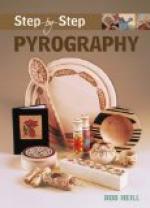As Wilfrid’s pottery prospered he found another use for the building. There was no tavern thereabouts, and when the Saxon abbey five or six miles away could house no more guests, or his workmen could not all find lodging in the neighborhood, it was possible to shelter there. The roof was weather-tight, a wood fire could be built on the stone hearth, and with fresh straw from Borstall Farm for beds, provisions from the same source, and their own cloaks for covering, travelers found themselves fairly comfortable.
Like others of its kind the building came to be known as “Cold Harbor,” a “herbergage” or lodging, without food or heat being provided. Sometimes an enterprising innkeeper would take possession of such a place after a time and furnish it as an inn.
At this very time, unknown to Wilfrid, some of his friends were discussing such a possibility as they rode up from Dover. Gilbert Gay the merchant, his wife Thomasyn and his son Nicholas were returning from France, and in their company were Alan of York and Josian his wife, Guy Bouverel the goldsmith, and others. West of Canterbury they came up with a stout bright-eyed little man who looked as if he had fed well all his life, and was called Martin Bouvin.
“What luck, Martin?” asked Master Gay. The little man spread his hands in a gesture of comic despair. All the tavern-sites seemed to be held by some religious house that owned the land, or some nobleman who allowed the innkeeper to use his device as a sign.
“There ought to be an inn there in Sussex where Wilfrid’s pottery is,” observed the goldsmith. “When I halt there to see Wilfrid I find nine times out of ten that I must e’en quarter myself on him. D’ye remember that old place he calls Cold Harbor? That would be a proper house for a tavern.”
“It is not large enough,” objected the merchant. “Any tavern worth the name would need more room than that within a twelvemonth. Still, other buildings could be added. If you and the potter can come to an agreement, Bouvin, I will aid you in fitting up the building and you may repay me in dinners. There’s not a cook this side Rouen who can match your chestnut soup.”
“Made with the yolk of an egg and a little wine of Xeres?” asked Guy with interest. “Giovanni made it so for us once.”
The merchant waved a protesting hand. “No, no, no, no—lemon, man, lemon, with white stock, pepper, salt, a little parsley. Sherry is an excellent drink, but not in chestnut soup, I pray you.”
“What matters it,” asked Alan innocently, “so the food is wholesome and pleasant?
“That is what might be expected of you, you Northern barbarian,” laughed Guy. “Where did you get your cunning, Martin?”




